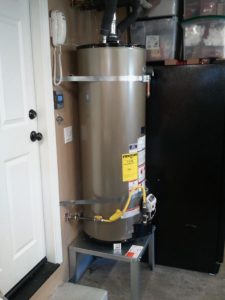Water Heater Maintenance For Homeowners
Having a basic understanding of your water heater is important for your safety and for the longevity of the unit. It is also essential that annual maintenance is performed by a professional technician to keep it running efficiently and minimize repair issues.
Learn about your water heater and what you can do to prolong the life of the heater.
Water Heater Maintenance
Very few people know that in order to keep your water heater running properly and efficiently very simple maintenace procedures need to be performed. (These come with the instructions and are often overlooked.)
As water is pumped into your water heater tank dirt, sediment and various minerals settle on the bottom. Depending on your water quality these extra “ingredients” can add up rather quickly robbing your water heater’s efficiency and costing you in the long run. If left unchecked they can not only make your water heater work harder but also allow your tank to rust and slowly be eaten away until you need to replace the entire unit which is very costly yet easily preventable. And cheap to prevent! You just need a hose, bucket (optional) and gloves (optional too, but safer with.)
Here’s What You Need To Do:
Adjust the thermostat to 120 degrees. You’ll save up to 5% in energy costs for every 10 degrees you lower the temperature, plus you’ll reduce the risk of scalding.
Always maintain 2 feet of clearance around the appliance unless the manual specifically states otherwise.
Drain about a quarter of the tank a few times a year to remove sediment and debris. Turn off the cold water supply, hook up a garden hose to the drain valve, then run into a bucket until the water is clear. If the water remains cloudy, briefly open the water supply valve to stir up remaining sediment, and drain the tank again. This also makes the unit operate more quietly.
Annually test the temperature-pressure relief valve by quickly discharging it two or three times. Following the testing, keep an eye out for small leaks from the valve.
Examine the sacrificial anode rod every three years by loosening the hex head screw and removing it. Replace the rod if:
- More than 6 inches of the core steel wire is exposed.
- The rod is less than 1/2 inch thick.
- The rod is coated with calcium.
- You can buy a 13-inch zinc-aluminum anode rod for about $16.
Insulate older units with a fiberglass jacket to improve efficiency, being careful to avoid contact with the flue (newer units already are insulated — check your owner’s manual to make sure). Also, insulate the hot and cold water pipes.
Why We Should Maintain Our Water Heater
Sediment buildup is very common in water heaters, and can be a major contributor to making your system less efficient. If you’ve ever heard banging or knocking noises coming from your water heater, this is likely a sign that you need to have your water heater flushed. The sediment is caused from loose minerals in the water, which then settles on the bottom making it more difficult to produce hot water. We suggest that you flush your water heater at least once a year or every 6 months. Call (214) 238-8353 us for your home service and repair needs.
For more related articles and info visit https://www.berkeys.com/category/plumbing-articles/
